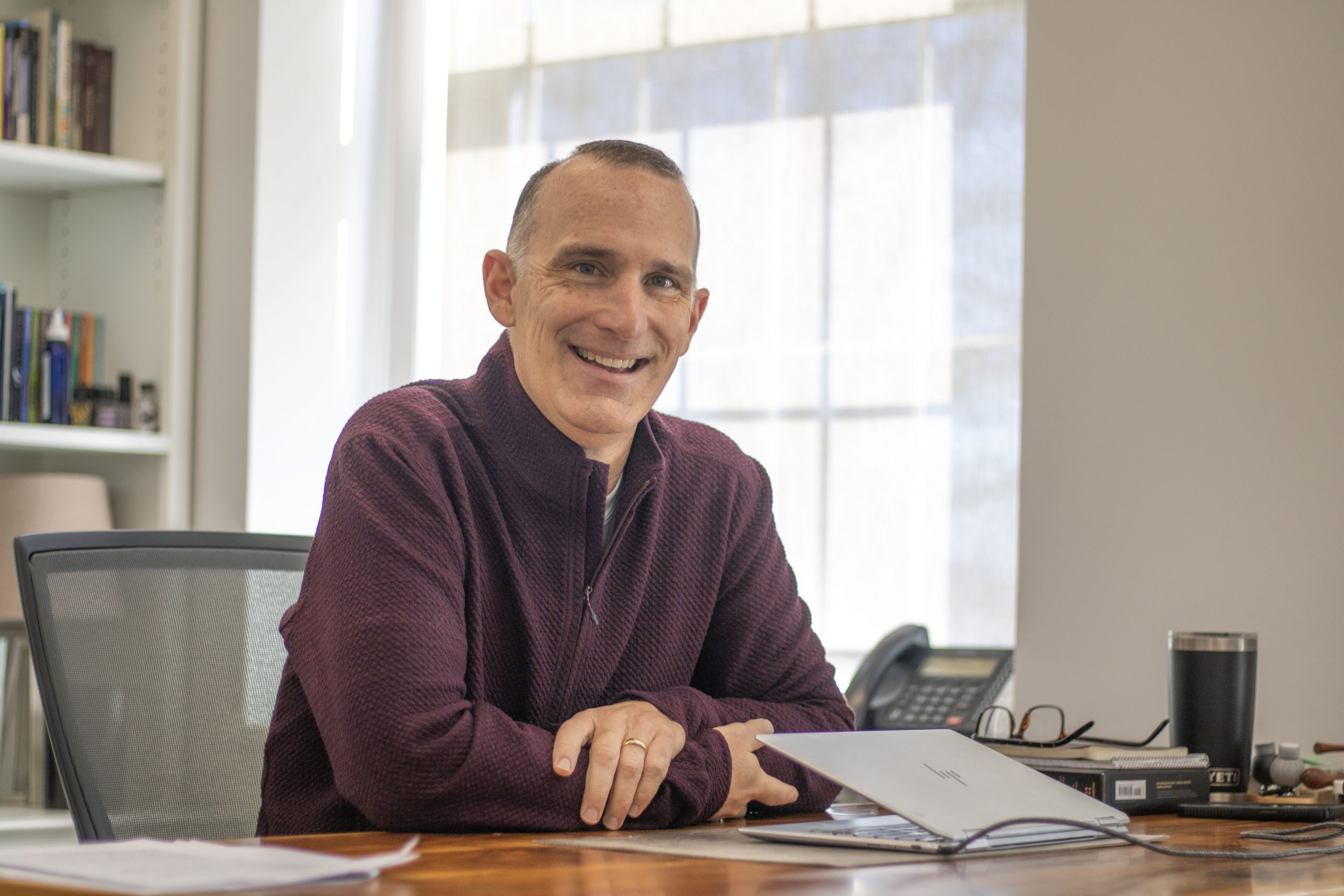
Pastor Andy Winn of First Baptist Church of Durham at his desk. (Photo by Giselle Weber)
Thursday, Feb. 29, 2024
By Giselle Weber
In 1845, amid the rolling hills of Durham, the seeds of faith were planted by three elders from Shady Grove Baptist. Meeting only once a month, their gatherings were humble yet filled with fervor, led by their first pastor, Jesse Howell.
The church’s meetings remained sporadic until 1873 when the rhythm of weekly gatherings took root. Originally known as Rose of Sharon Church, First Baptist Church began planning its first physical manifestation in 1846, erecting a modest structure near the railroad tracks at Durham Station in 1850. However, the proximity to the trains proved disruptive, prompting a move northward, closer to their current location where the church nestled itself at the heart of the community.
Over the years, FBC’s journey saw several relocations, each a testament to their unwavering dedication to serving their congregation and the broader community. The church adapted and expanded, settling into its present-day home in 1927.
As the church grew in size and stature, so did its vision for the city. In 1876, under the leadership of Columbus Durham, FBC began hosting weekly Sunday services, marking a pivotal moment in its mission to spread the gospel throughout Durham. Bolstered by a zealous spirit, FBC set its sights on planting new churches, rooted in Bible studies on the city’s outskirts, nurturing faith communities that echoed its founding congregation’s core values and mission.
Through the lens of history, FBC emerges not just as a church, but as a beacon of faith and resilience, navigating the winds of change with unwavering conviction and steadfast dedication to its calling. From humble beginnings to its present-day impact, the story of First Baptist Church of Durham is a testament to the enduring power of faith and community in shaping the tapestry of a city’s history.
Throughout its history, FBC has remained rooted in its mission to serve both its congregation and the broader community. This commitment is evident in the church’s focus on reproduction — planting new churches and nurturing Christians.
“The members of FBC were always zealous in establishing new congregations,” William Boyd, a historian for Durham said.
FBC centers its beliefs and actions on the authority of the Bible. As Pastor Andy Winn said their guiding principle is to ask, “What does the Bible say?” This commitment to biblical truth informs all aspects of their ministry.
Today, FBC continues to impact its community through various outreach programs and services. They host health fairs and pop-up health clinics, leveraging the expertise of the abundance of medical professionals who attend their church to benefit the community. Additionally, the church offers ESL classes for international students, impacting over 100 individuals weekly.
FBC’s dedication to community care extends to refugees, offering tutoring, transportation assistance, and support for job interviews and paperwork. They also prioritize sanctity of life initiatives, providing resources for adoption and foster care, with several families within the congregation having adopted children. Winn emphasizes the significance of recognizing that all individuals are created in the image of God.
“We are all created in the image of God, male and female… it affects how I interact with the homeless or the owner of a local coffee shop. It affects how I interact with every person,” Winn said. There is one God. He exists, he is the creator, [and] we are created, but we also sin. We believe that we fall short. Sin is lawlessness, transgressing, and breaking God’s laws. So we have got a problem. Look at society, you look and see suffering. But, we believe that there’s hope.”
Central to FBC’s mission is their belief in the importance of salvation and sharing the hope of Christ. Winn emphasizes that while addressing physical needs is important, addressing eternal needs through the preaching of God’s word is crucial.
He cites Romans 10:14, “How, then, can they call on the one they have not believed in? And how can they believe in the one whom they have not heard? And how can they hear without someone preaching to them?”
This underscores the necessity of preaching for people to receive the message of salvation.
For FBC, preaching the word remains their core strength. Their conviction in the transformative power of the gospel drives their efforts to share the hope found in Jesus Christ with their community.
Ultimately, FBC sees their role as not just meeting temporal needs, but addressing the deeper spiritual hunger that only Christ can satisfy.
“We do want to alleviate human suffering,” Winn said. “But we are primarily concerned with alleviating eternal suffering. It’s the joy of sharing that hope is in Jesus Christ. The greatest title we will ever have is being called a child of God.”
Through their steadfast commitment to preaching the word and serving their community, FBC continues to make a lasting impact in Durham and beyond